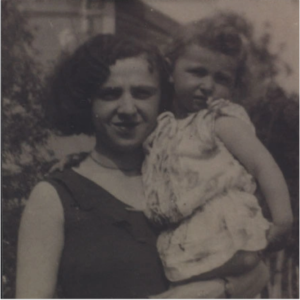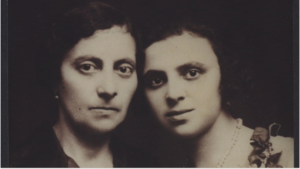17-year-old Alia Saphier interviews Rose-Helene Spreiregen about her past, and antisemitism today

Rose-Helene Spreiregen, age 3, with her mother (left).
December 12, 2024
‘I have an obligation, to speak for them’: My conversation with a Holocaust survivor
Growing up in the US as the granddaughter of a Holocaust survivor, it was hard to reconcile my Jewish identity with the lack of emphasis I felt was placed on the Holocaust. I didn’t see any remnants of the Holocaust, nor did I learn the history as thoroughly as countries that experienced the atrocities first-hand. As a kid, I didn’t really recognise the presence of antisemitism in my day-to-day life either.
But since the Hamas attack on Israel on 7 October 2023, antisemitism has been increasing at an alarming rate, especially in the United States. The Anti-Defamation League (ADL) has reported that younger Americans are more likely to believe anti-Jewish tropes, with millennials being the most likely, closely followed by Gen Z.
What is striking about this data is that the older generations, the oldest studied generation being baby boomers, were less likely to believe in the same antisemitic tropes that younger generations often fall prey to.
As survivors and direct memories of the Holocaust become more distant, our world will change. I reached out to the United States Holocaust Memorial Museum with a request for an interview to discuss the necessity of preserving Holocaust memory in today’s world.
Rose-Helene Spreiregen is a 93-year-old Holocaust survivor who was born in Paris and has lived in Washington, DC since 1961. She currently volunteers at the museum and can be found at the Survivors Desk. Her journey to survival inspires visitors, and all who read about her online. I was very honoured to talk to Rose-Helene about her experiences and perspective on the modern day.
Born in 1931, she was raised by her mother Rivka and her grandmother Sarah, both of whom emigrated to France from Poland. Her first memories of hearing about the Nazi rise to power are from visits home from boarding school, when she overheard her mother’s conversations. She moved back home shortly before the German invasion of Poland on 1 September 1939.
Out of fear of German attacks, Rose-Helene, alongside young and old members of the Jewish community in Paris, evacuated to the country. After the German invasion of France in May 1940, many others followed suit, including her mother. But, injured upon her arrival, her mother returned to Paris, taking Rose-Helene with her.
Living in Nazi-occupied northern France, the family witnessed the beginning of the Jewish deportations from France to occupied Poland, where the Jews were either placed into forced labour camps or murdered. In danger of being arrested when in public, it became unsafe for Rose-Helene to attend school. She evaded arrest, but her mother was arrested and deported.
Rose-Helene moved into her mother’s empty apartment under the care of her grandmother. She had to assume most adult responsibilities as her grandmother feared arrest and rarely ventured outside. Their neighbours helped them avoid routine round-ups, and because they were living in the apartment of her mother who had already been deported, they were able to survive for some time. However, upon hearing of another round-up, Sarah was eager to flee Paris with forged identification papers.
Rose-Helene recounts the story of her escape powerfully. Aged 12, she and her grandmother fled on an overnight train to the unoccupied south of France. Recognizing the danger of having her Polish-Jewish grandmother give away their cover through her broken French, she told her to pretend to sleep. This way, Rose-Helene, fluent in French, could speak to the French and German officials checking their papers. She said to the Holocaust Memorial Museum, “I was shaking for hours… this could have been the end of us.”
The Allies liberated Voiron, where the two were living, in August 1944. They returned to Paris in November. Sarah found her apartment looted and rented to other people. At the age of 16, Rose-Helene lived alone in her mother’s apartment, hoping for her mother’s return. But she never saw her again, ultimately finding out that she had most likely been murdered at the Auschwitz-Birkenau concentration camp.
Rose-Helene re-enrolled in school, graduated and got a job in banking. In 1961, she married an American and moved to the US.
[Anti-semitism] is, to me, very scary, because it doesn’t stop with words. And this is what actually happened when Hitler came to power in 1933
Rose-Helene Spreiregen, 93-year-old Holocaust survivor
During our conversation, Rose-Helene’s perspective on the rise of antisemitism she sees occurring today is crucial. She said, “It was not OK as it is now to be an antisemite. And many antisemites now don’t feel that they should be in their closet. They just come out and say so.”
“This is, to me, very scary, because it doesn’t stop with words. And this is what actually happened when Hitler came to power in 1933. It reminds me very much of what happened during the Holocaust, because it’s like it’s all happening again.”
According to the ADL, there have been more than 10,000 antisemitic incidents in the US between 7 October 2023 and 24 September 2024 – a 200% increase on the previous year. Before the Hamas attack on Israel, around 3,325 antisemitic incidents were tracked.
Holocaust denial is one form that antisemitism takes. Whether intentional or not, ignorance of the genocide perpetrates falsehoods about Jewish history. Some who actively ignore the events of Holocaust even believe that the atrocities were exaggerated to advance the Jewish people. Both active and unintentional forgetting lead to the confusing and misunderstanding of history and the truth.
When discussing how she witnesses the growing antisemitic sentiment in the US, Rose-Helene says: “The political system is scary to me, because depending who is in charge, antisemitism is more overt, and it’s more accepted – not acceptable, but more accepted… Having seen it, having seen what it does… I thought I had seen it all – that it was never going to happen again – but it seems to be getting very bad.”
Art of forgetting and remembering. On Lithuania's path to the commemoration of Holocaust victims
The prevalence of denial speaks volumes about our education system. A Claims Conference surveyfrom 2020 found that 23% of Americans aged under 40 believe the Holocaust is a myth or exaggerated, while 12% said they never heard of it.
Claims Conference also found what they describeas critical gaps in knowledge: “63% of US millennials and Gen Z do not know that six million Jews were killed during the Holocaust and just over one-third (36%) of US millennials and Gen Z believe two million Jews or fewer were killed during the Holocaust.”
That is why education is key to combating misinformation and lack of understanding. However, with the deaths of survivors, we face an unprecedented time where our knowledge about this historic event will no longer be able to come from first-hand accounts, making it increasingly difficult to educate people about the Holocaust.
On this topic, Rose-Helene said to me: “It’s one thing to know what happened during the war, but it’s something else to see the person who was there, who can tell you about it, and you can ask questions. Obviously, if you read a book or if you see a film, you can’t ask questions, and it’s much more abstract.”





